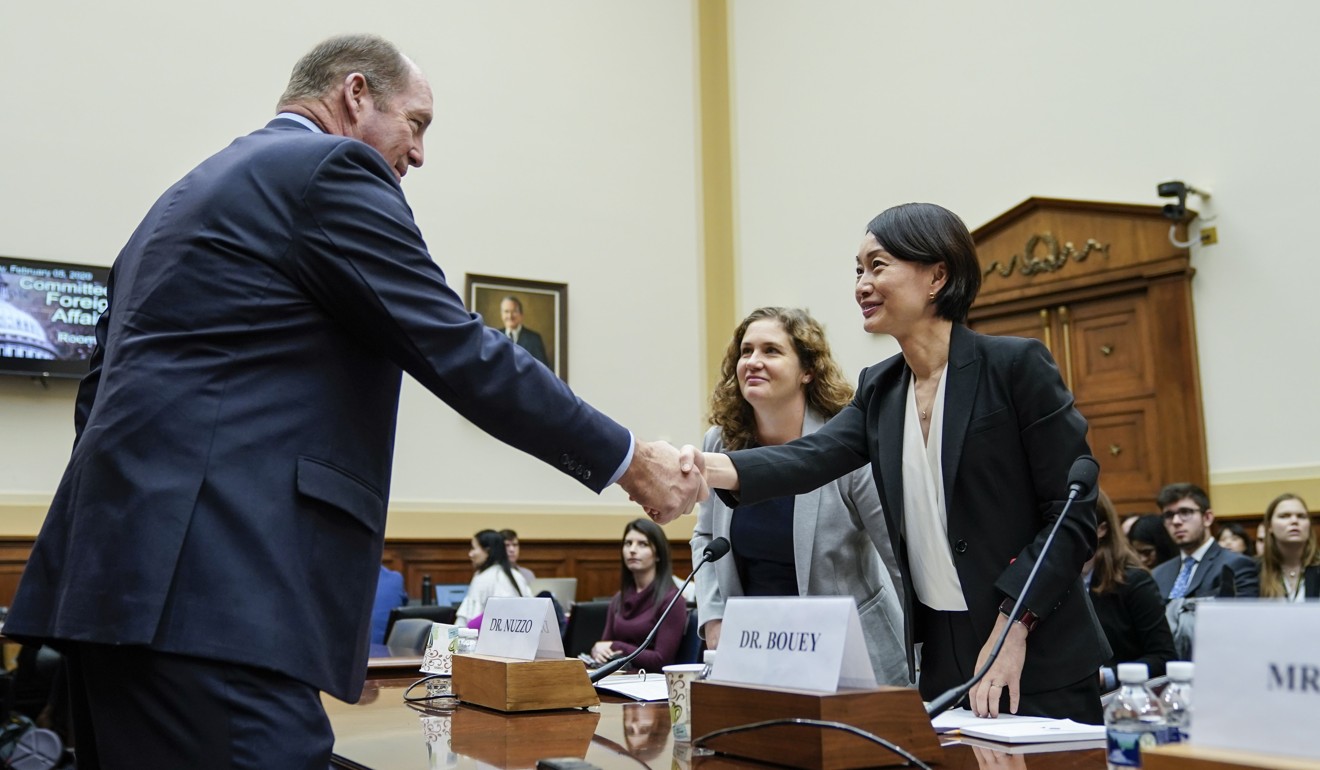Coronavirus: health experts tell US Congress travel bans will not stop the outbreak
- Travel bans and quarantines targeting travellers from China, lawmaker hear, are ‘effectively penalising’ the country and may chill the sharing of information
- Those testifying suggest bolstering the preparedness of public health providers in the US and increasing international collaboration

Public health experts warned US lawmakers on Wednesday that aggressive travel restrictions and quarantining measures would do little to combat the global spread of the coronavirus outbreak.
Testifying on Capitol Hill, the experts, including the former coordinator of the US government’s response to the Ebola virus, cautioned that travel bans were not only generally ineffective but could also thwart the ability of the US to work with global partners, including China, to counter the outbreak.
Since Sunday, the US has denied entry to non-US citizens – with some exceptions – arriving from China and quarantining those arriving from Hubei province, where the contagion originated.
Though the US is not the only nor the first nation to institute such measures, Beijing has singled it out as what it considers an instigator of rising global panic over the outbreak of the contagion, also known as 2019-nCoV.
The “best evidence” drawn from past global epidemics had shown that lockdowns on travel generally only delayed an introduction of a contagion by a matter of weeks, said Jennifer Nuzzo, an associate professor at Johns Hopkins University’s Centre for Health Security.
“That is not meaningful in the context of developing a vaccine,” said Nuzzo, estimating that development of a vaccine in this case could take up to a year.
Moreover, she said, by instituting travel bans and quarantines targeting travellers from China, the US was “effectively penalising” the country for reporting cases, adding that such actions could diminish Beijing’s willingness to share data and discourage other countries from being transparent about their own outbreaks.
Instead, the experts testifying before lawmakers on a House foreign affairs subcommittee urged the government to focus its attention on bolstering the preparedness of public health providers in the US and increasing international collaboration, particularly with China’s health authorities.
Ron Klain, a former government official who led the Obama administration’s response to the Ebola outbreak in 2014-15, said: “The best way to keep Americans safe is to eschew isolationism and help other nations combat the virus.”
Klain praised the Trump administration’s creation last week of a task force, chaired by Health and Human Services (HHS) Secretary Alex Azar, to coordinate a multi-agency response to the outbreak.
But those efforts were undermined by the absence of a full-time official overseeing the administration’s actions, said Klain, pointing to US President Donald Trump’s disbanding in mid-2018 of the National Security Council’s pandemic preparedness and response directorate.
According to committee leaders, administration officials had rejected invitations to testify on Wednesday, in what was the first congressional hearing on the coronavirus.
“I’m profoundly disappointed that the Trump administration would not agree to send any government officials to testify today,” said Representative Eliot Engel, Democrat of New York.
Behind closed doors, public health officials from the Centres for Disease Control and Prevention (CDC), HHS and other agencies have provided numerous briefings to lawmakers about the status of the government’s response to the contagion’s spread.
As of Wednesday, the virus has infected more than 27,600 people worldwide and killed at least 560. All but two of those deaths have occurred in mainland China.

Wednesday’s hearing came amid growing calls from Congress on the administration to submit a formal request to the legislative branch for additional emergency funds before Monday, when Trump is set to release the fiscal budget for the coming year.
In a letter on Tuesday, House Democrats working on appropriations appealed to the executive branch to request emergency funding from Congress to funnel into the development of vaccines, direct assistance to state and local health departments and enhanced screenings at airports, among other initiatives.
“Tell us what you need, and then we’ll work to get that available to you as quickly as possible,” Representative Ami Bera, Democrat of California and chairman of the subcommittee on Asia, the Pacific and non-proliferation, said on Wednesday.
Wednesday’s warnings about the efficacy of measures the Trump administration has taken echoed concerns raised this week by a former senior World Health Organisation (WHO) official who said containment of the virus depended not on border control but on the strength of countries’ domestic health care systems.
“Borders cannot stop infectious diseases, and you may have your eye on one border and one activity and the other activity escapes you and something comes in from another side,” David Heymann, who oversaw the WHO’s response to the Sars crisis, said at an event in London.
WHO officials have urged countries that have implemented travel bans, which include Singapore, Japan and the US, to consider rolling back the restrictions.
Such calls come amid growing reports of increased stigmatisation of and discrimination towards ethnic Chinese people around the world.
Calling out policies that distinguish between the “colour of the passport someone carries”, Klain said that “all of us need to be on the watch” for discrimination against Chinese-Americans and Chinese immigrants.
“It is a battle between human and virus,” said Jennifer Huang Bouey, an epidemiologist and specialist in China policy at the RAND Corporation. “It’s not between person to person, it’s not between party to party, it’s not between country to country.”
Purchase the China AI Report 2020 brought to you by SCMP Research and enjoy a 20% discount (original price US$400). This 60-page all new intelligence report gives you first-hand insights and analysis into the latest industry developments and intelligence about China AI. Get exclusive access to our webinars for continuous learning, and interact with China AI executives in live Q&A. Offer valid until 31 March 2020.